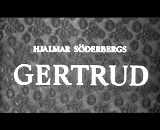
|
Gertrud (1964, Denmark)
In Carl Dreyer's deliberately-paced, meditative romantic
drama, the director's final completed feature film (noted for very
lengthy takes and lots of dialogue) - a profound masterpiece about
the search for ideal love without compromise by a woman who had four
suitors during her lifetime:
- the dilemma and distress facing ex-opera singer
Gertrud Kanning (Nina Pens Rode) of her loneliness and emptiness
in a crumbling and loveless marriage; in their claustrophobic apartment
in Copenhagen, she told her career-minded husband - a middle-aged
lawyer and politician Gustav Kanning (Bendt Rothe), that she was
leaving him (and wished to separate and file for a divorce), because
of their loss of love for each other, and that she had found love
with another unnamed man; she expressed her main complaint about
his emphasis on work, and her need to place love first and foremost:
("The man I'm with must be completely mine. I must come before
everything. I don't want to be an occasional plaything");
Gustav replied:
"Yes, but sweet Gertrud, love alone is not enough in a man's
life. That would be ridiculous for a man"; she reminded him: "See
for yourself how little I mean to you and how insignificant the void
becomes when I leave now"
- the scene of a romantic rendezvous in a park on a
bench near a lake (where there was a statue of Aphrodite), filmed
with a moving camera, as Gertrud approached with anticipation to
speak to her lover Erland Jansson (Baard Owe), a promising young
composer; she told him of her plan to leave her husband, before they
departed for his place to make love for the first time; she undressed
(seen in shadow) as he played a piano piece
- the sequence of Gertrud's warning by her ex-lover,
poet Gabriel Lidman (Ebbe Rode) - who had attended a courtesan's
party the night before, and overheard philandering Erland Jansson
bragging that Gertrud was his "latest conquest": ("In
this mixed company, in this atmosphere of drinking, playing and whoring
around, he spoke aloud of his latest conquest. And he named
her, her beloved name")
- the second sequence in the park between Erland Jansson
and Gertrud when she told him of her complete love, but he confessed
that they could not run away together because he had already impregnated
another woman - she was stunned
- the long sequence between Gertrud and ex-lover Gabriel
- when he pleaded with her in her drawing room to come back to him:
("You taught me love is everything. We shouldn't be alone. I
have been alone much too much. We shouldn't be just one of many.
We need to be one of two") - but she declined his offer when
she became realistic about their future together: "Nothing's
ever like one thinks"
- in the poignant conclusion, 30 years into the future,
the uncompromising white-haired Gertrud (exiled in Paris and single),
who believed in absolute and idealistic love, had lived out her life
mostly in solitude and seclusion in the country: ("Yes, I live
here like a hermit, forgotten, erased. I like it that way. I need
solitude - solitude and freedom"); she reflected on her life
with her old, polite and gallant psychologist friend Axel Nygren
(Axel Strøbye); he asked for all his old letters back and
burned them in the fireplace; she read outloud a poem she had written
when she was 16: "'Just look at me. Am I beautiful? No, but
I have loved. Just look at me. Am I young? No, but I have loved.
Just look at me. Do I live? No, but I have loved.' Sixteen-year-old
Gertrud - my gospel according to love"; Axel reminded her of
what she had said: "There's nothing else in life but love. Nothing.
Nothing else. Do you still stand by those words? Do you regret them?" -
she replied: "No, I don't regret them. I stand by what I said.
There's nothing else in life, but youth and love, unending tenderness
and quiet happiness, Axel"
- in the final moments of the film, she admitted she
had already bought her "resting place" gravesite under
a mulberry tree; she described the two words that she had ordered
for her headstone: ("...just two words, amor omnia...Love
is all"); as they rose, she added: "The gardener has been
told that only grass shall grow on my grave and in springtime I shall
have anemones. You'll come by one day, pick an anemone and think
of me. Take it as a word of love that was thought, but never spoken.
Now you'd better go, otherwise we'll end up by running off to Paris.
One day your visit will be only a memory as all the other memories
I cherish. Sometimes I bring forth the memories and lose myself in
them. I feel as if I am gazing at a fire about to be extinguished.
Thank you, Axel. Thanks for visiting. Thank you for your book";
they shook hands as he replied:
"Goodbye, Gertrud" - twice, they waved to each other from
a distance; once she closed her door, the camera remained focused on
the outside of her door before a fade to black
Thirty Years Into the Future -
A Bittersweet Reunion With Old Friend Axel
|
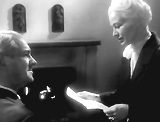
|
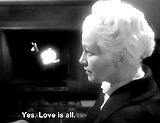
|
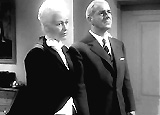
|
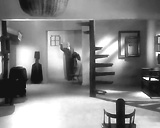
|
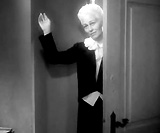
|
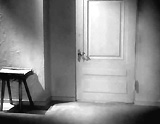
|
|
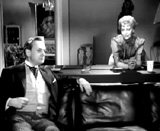
Gertrud Divorcing Her Husband Gustav

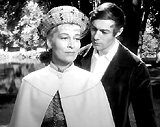
Romantic Rendezvous in Park Between Gertrud and Erland
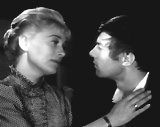
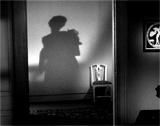
Undressing in Shadows at Erland's Place
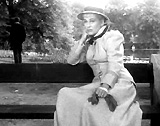
Deserted by Erland
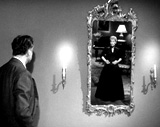
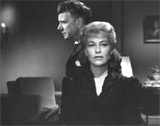
Gertrud with Ex-Lover Gabriel
|









